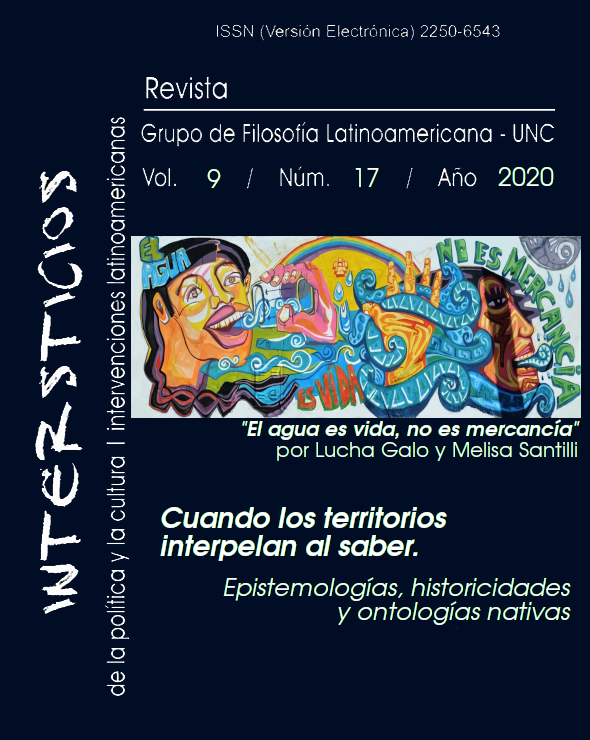Postcolonial modulations and knowledge. Notes.
Keywords:
modulation, philosophy, colonialism, poscolonialAbstract
This essay approaches, in the mode of an open question, the problem of the difference which is introduced by postcolonial readings in the forms of knowledge, and it notes the possible modulations of the space where interactions and symbolic exchanges occur in research. Such space is presented as an arena where unfold tensions between knowledge organized in disciplines or fields of knowledge and what they intend to study. It also explores, what happens when one of the variables that intervene in such tensions is moved.
Downloads
References
Beverly, J. (1999). Subalternity and Representation. Arguments in Cultural Theory. Durham: Duke University Press.
Bhabha, H. (2002). El lugar de la cultura. Buenos Aires: Manantial.
Catelli, L. (2013). “La ciudad letrada y los estudios coloniales: perspectivas descoloniales desde la “ciudad real´”.Vanderbilt e-Journal of Luso-Hispanic Studies, [S.l.], (v. 9), pp. 56-76.
Césaire, A. ([1969] 2011). Una tempestad (edición bilingüe). Traducción de Ana Ojeda y prólogo de Rocco Carbone y Leonardo Eiff. Buenos Aires: El 8vo Loco Ediciones.
Césaire, A. (1983). “Le verbe ́marronner ́ / à René Depestre, poète haïtien”. En A. Césaire, The Collected Poetry. (Trad. Clayton Eshleman y Annette Smith. Berkeley, U of California P, (pp. 368-71). [Primera edición en francés: (1955), París, Présence Africaine.]
Césaire, A. (2006). Discurso sobre el colonialismo. Madrid: Akal.
Clifford, J. (1995). Dilemas de la cultura. Antropología, literatura y arte en la perspectiva posmoderna. Barcelona: Gedisa
De Certeau, M. (1995). Historia y psicoanálisis. México: Universidad Iberoamericana. Departamento de Historia. Instituto Tecnológico y de Estudios Superiores de Occidente.
De Certeau, M. (1999). La escritura de la historia. México: Universidad Iberoamericana.
De Oto, A. (2011a). “Aimé Césaire. Poética y política de la descolonización”. En A. Arpini, C. Jalif, M. Olalla (comps.). Diversidad e integración en nuestra América- De la modernización a la liberación (1880 – 1960). (pp.277-292). Buenos Aires: Biblos.
De Oto, A. (2011b). “Aimé Césaire y Frantz Fanon. Variaciones sobre el archivo colonial/ descolonial”. Tabula Rasa, (15), pp. 149-169.
De Oto, A. (2016). “Decolonialidad. Exploraciones fanonianas”. En H. Biagini y G. Oviedo (comp.). El pensamiento alternativo en la Argentina contemporánea. Tomo III. Derechos Humanos, Resistencia, Emancipación (1960-2015). (pp. 153-164). Buenos Aires: Editorial Biblos.
Escobar Negri, M. (2020). dobles. Una poética poscolonial de la diferencia. Buenos Aires: Prometeo (en prensa).
Fanon, F. (1994). Los condenados de la tierra. Prefacio de Jean Paul Sartre. Trad. de Julieta Campos. México D. F.: FCE.
Fanon, F. ([1952] 2009). Piel negra, mascaras blancas. Madrid: Akal.
Geertz, C. ([1980] 1991). “Géneros confusos. La refiguración del pensamiento social”. En C. Reynoso (comp). El surgimiento de la antropología posmoderna. (pp. 63-77). Barcelona: Gedisa.
Hartog, F. (2007) Regímenes de historicidad. Presentismo y experiencias del tiempo. México: UIA
Merleau-Ponty, M. (1957). Fenomenología de la percepción. Emilio Uranga (trad.), México, Fondo de Cultura Económica. [Primero edición en Francés, 1945. Phénoménologie de la perception. Paris, Libraries Gallimard].
Mignolo, W. (2000). Capitalismo y geopolítica del conocimiento. Buenos Aires: Ediciones del Signo.
Mignolo, W. (2002). “Geopolítica del conocimiento y diferencia colonial. Traducción del articulo Geopolitics of knowledge and colonial difference”. The South Atlantic Quarterly, (101), pp. 57–96.
Mignolo, W. (2003). Historias locales–diseños globales: colonialidad, conocimientos subalternos y pensamiento fronterizo. Madrid: Akal.
Said, E. ([1978] 1990). Orientalismo. Madrid: Libertarias/ Prodhuf.
Salazar Bondy, A. (1968). ¿Existe una filosofía de nuestra América? México: Siglo XXI.
Salazar Bondy, Augusto. (1974). “Diálogos indianos entre Bartolomé de las Casas, Frantz Fanon, el cacique Hatuey y Ginés de Sepúlveda”. Crisis , (12), pp 37–39.
Tyler, S. (1986). “Post-Modern Ethnography: From Document of the Occult to Occult Document”. En J. Clifford & G. Marcus (eds.). Writing Culture The Poetics and Politics of Ethnography. (pp. 122-140). Berkeley: University of California Press.
Zea, L. (1969). La filosofía americana como filosofía sin más. México: Siglo XXI.
Downloads
Published
Issue
Section
License

This work is licensed under a Creative Commons Attribution-NonCommercial-ShareAlike 4.0 International License.
Authors who have publications with this journal agree to the following terms:
a. Authors will retain their copyright and grant the journal the right of first publication of their work, which will simultaneously be subject to the Creative Commons Attribution License that allows third parties to share the work as long as its author and first publication in this journal are indicated.
b. Authors may adopt other non-exclusive license agreements for distribution of the published version of the work (e.g., deposit it in an institutional telematic archive or publish it in a monographic volume) as long as the initial publication in this journal is indicated.
c. Authors are allowed and encouraged to disseminate their work through the Internet (e.g., in institutional telematic archives or on their web page) after the publication process, which may produce interesting exchanges and increase citations of the published work (see The effect of open access).


